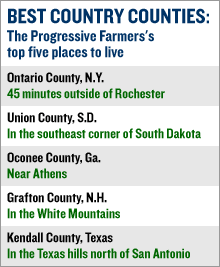|
Best places to live: Rural America
Progressive Farmer crunches the numbers and picks the nation's top rural counties on price, pollution, education, recreation and more.
NEW YORK (CNNMoney.com) - New York State, home to the nation's most populous city, also has the best rural county to live in, according to the latest issue of the lifestyle magazine the Progressive Farmer. Deep, clear glacial lakes, grapes grown on some of the richest farmland in the country and a smoothly-functioning local government are some of the attributes that landed Ontario County, located 45 minutes from Rochester, at the top of the 2006 survey, the magazine's second.
In addition to such tangible attributes, the magazine also considered cost of living, crime rates, air quality, access to healthcare, education and leisure activities. The magazine used data compiled by OnBoard LLC. The result is a list of 200 counties across the nation where city dwellers or suburbanites could ditch the rat race for quiet, clean country living. For Progressive Farmer's complete story and full list, click here. The Progressive Farmer is owned by CNNMoney.com parent Time Warner. Oconee, Ga. made the list at No. 3, in part due to its proximity to the college town and cultural hotbed of Athens. Grafton, N.H. is on the list for the second year in a row, this year at No. 4. The northern county is settled in the heart of the White Mountains, with abundant skiing, hiking and other recreational opportunities, and is also home to Ivy League Dartmouth College. Hood River County in Oregon, an hour's drive from Portland with fruit orchards and vineyards, green dome hills and jaw-dropping vistas of the craggy Mt. Hood, ranked No. 10. Criteria such as healthcare, education and leisure activities explain why many of the selections are near major urban areas. "We feel like we're going to see that in every list," Jamie Cole, Progressive Farmer's creative director, told CNN/Money. "As this trend of moving to rural counties continues, most people are going to look just one or two counties over." Cole said that while a lot of the people moving to the country are professionals from the city or suburbs, they aren't necessarily looking to recreate their old life with simply a different view from the kitchen window. "They're not moving out buying a McMansion on an acre," he said. "They're buying 20, 30, 40 acres." And not only are they buying it, but they want to learn how to make money from it through farming or raising animals, he said. The influx of city folk to the countryside has resulted in the usual land use and infrastructure stress caused by urban sprawl, and many of the old time residents in the article were quick to point that out. While there is some tension between old and new residents, Cole said some of that is relieved by the willingness of the newcomers to learn the ways of the land, and the willingness of the old hands to help them. "You've got to learn that stuff somewhere, and a book isn't going to do it," he said. "But they guy who's been living next to you for generations can teach you if you want to learn." Also heartening for this latest round of back-to-the-landers -- real estate prices in many places haven't skyrocketed the same way they have along the coasts. "I don't see the same bubble in rural areas," said Cole. "There are some good values out there." Also see Best Places to Live:
|
|


